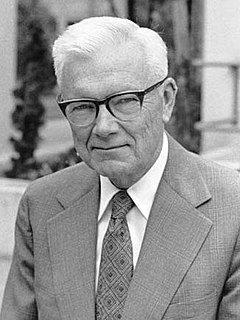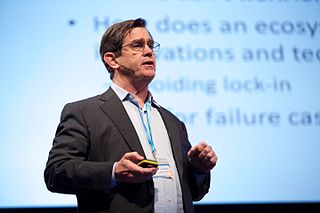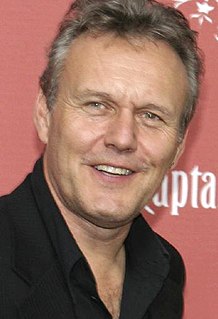A Quote by Paul Flory
Significant inventions are not mere accidents. The erroneous view [that they are] is widely held, and it is one that the scientific and technical community, unfortunately, has done little to dispel. Happenstance usually plays a part, to be sure, but there is much more to invention than the popular notion of a bolt out of the blue. Knowledge in depth and in breadth are virtual prerequisites. Unless the mind is thoroughly charge beforehand, the proverbial spark of genius, if it should manifest itself, probably will find nothing to ignite.
Quote Topics
Accidents
Beforehand
Blue
Bolt
Breadth
Charge
Community
Depth
Dispel
Done
Find
Genius
Happenstance
Held
Ignite
Invention
Inventions
Itself
Knowledge
Little
Manifest
Mere
Mind
More
Much
Nothing
Notion
Out
Part
Plays
Popular
Prerequisites
Proverbial
Scientific
Should
Significant
Spark
Sure
Technical
Than
Thoroughly
Unfortunately
Unless
View
Virtual
Widely
Will
Related Quotes
I found myself desiring and knowing less and less, until I could say in utter astonishment: "I know nothing, I want nothing." Earlier I was sure of so many things, now I am sure of nothing. But I feel I have lost nothing by not knowing, because all my knowledge was false. My not knowing was in itself knowledge of the fact that all my knowledge is ignorance, that "I do not know" is the only true statement the mind can make....I do not claim to know what you do not. In fact, I know much less than you do.
Sir,’ said Stephen, ‘I read novels with the utmost pertinacity. I look upon them--I look upon good novels--as a very valuable part of literature, conveying more exact and finely-distinguished knowledge of the human heart and mind than almost any other, with greater breadth and depth and fewer constraints.
There are significant relationships, of course, between wanting things and caring about them..The notion of caring is in large part constructed out of the notion of desire. Caring about something may be, in the end, nothing more than a certain complex mode of wanting it. However, simply attributing desire to a person does not in itself convey that the person cares about the object he desires.
Hitherto the principle of causality was universally accepted as an indispensable postulate of scientific research, but now we are told by some physicists that it must be thrown overboard. The fact that such an extraordinary opinion should be expressed in responsible scientific quarters is widely taken to be significant of the all-round unreliability of human knowledge. This indeed is a very serious situation.
Superficial knowledge ... is hurtful to those who possess true genius; for it necessarily draws them away from their main object, wastes their industry over details and subjects foreign to their needs and natural talent, and lastly does not serve, as they flatter themselves, to prove the breadth of their mind. In all ages there have been men of very moderate intelligence who knew much, and so on the contrary, men of the highest intelligence who knew very little. Ignorance is not lack of intelligence, nor knowledge a proof of genius.
In a world of widely distributed knowledge, companies cannot afford to rely entirely on their own research, but should instead buy or license processes or inventions (i.e. patents) from other companies. In addition, internal inventions not being used in a firm’s business should be taken outside the company.
Unless the people, through unified action, arise and take charge of their government, they will find that their government has taken charge of them. Independence and liberty will be gone, and the general public will find itself in a condition of servitude to an aggregation of organized and selfish interest.
During the last century, and part of the one before, it was widely held that there was an unreconcilable conflict between knowledge and belief. The opinion prevailed amoung advanced minds that it was time that belief should be replaced increasingly by knowledge; belief that did not itself rest on knowledge was superstition, and as such had to be opposed. According to this conception, the sole function of education was to open the way to thinking and knowing, and the school, as the outstanding organ for the people's education, must serve that end exclusively.
The more I draw and write, the more I realise that accidents are a necessary part of any creative act, much more so than logic or wisdom. Sometimes a mistake is the only way of arriving at an original concept, and the history of successful inventions is full of mishaps, serendipity and unintended results.
The virtual community? The word virtual does not mean "virtue." It means "not." When I go to the store and they say: The shirt that you brought in is virtually done. It means it is not done, in the same way that the virtual community is not a community. There is no commitment there. When you log off, you are not a member of it anymore. My flesh and blood community, the sense of knowing my neighbor, knowing the guy across the street, having dinner with the people down the block, getting along with each other and making compromises, that's a genuine community with a commitment.
Groups do not have experiences except insofar as all their members do. And there are no experiences... that all the members of a scientific community must share in the course of a [scientific] revolution. Revolutions should be described not in terms of group experience but in terms of the varied experiences of individual group members. Indeed, that variety itself turns out to play an essential role in the evolution of scientific knowledge.







































